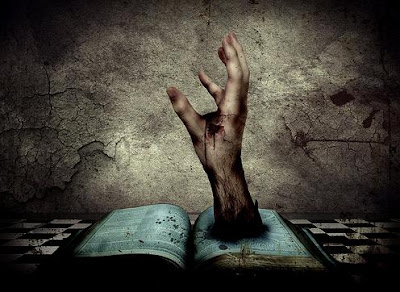Copyright 2019 by Gary L. Pullman
“When
you paint, always think of something else.”—Salvador Dali
Murder mysteries withhold
the explanation of the event or events upon which their stories
center—the crime (or what), the method of committing the crime
(how), the identity of the criminal (the who), the motive (why) or
some other element (when, where, how many, how much). Indeed, it is
by withholding such information that a mystery is
a mystery.
In
this regard, horror stories are mysteries, too, because they likewise
withhold the nature of the threat (who or, in horror, what, since
many horror villains are monsters or other inhuman beings), the cause
(how), the quantity (number, usually, rather than volume) of the
antagonists or their victims, or some other element.
Often,
such withholdings are fairly straightforward, but, in the hands of
accomplished writers, the mystery can be sophisticated, either in
itself or in its execution. Shirley Jackson, who is surely a
sophisticated writer of horror fiction (and other genres), is a case
in point.
In
one of her stories, unpublished until 2015, nearly half a century
after her demise, her protagonist, Mr. Halloran Beresford prides
himself on his appearance and congratulates himself for remembering
his wife's birthday: he has bought a box of chocolates for her.
However, he does not stand out from others in a crows. Nevertheless,
he seems satisfied with himself and his mundane life. In fact, he
seems a little smug. He interprets harmless, everyday actions,
whether they are innocent in themselves or rude, as deliberate acts
of aggression directed at him personally. An observant man, he
notices details and, at times, obsesses about others—a “man in a
pale hat,” a store clerk, a bus driver, even, at last, his own
wife. At first, there is just enough sense in his interpretations of
these details to make one wonder whether he is being stalked or
harassed, but, ultimately, they don't add up. Why would strangers,
unknown to him and to one another, conspire or act by sheer
coincidence to abuse him? Why would the woman to whom he's apparently
been married for years do so? None of them has a motive to join
others to persecute him, save for the man in the pale hat, perhaps,
who, Mr. Beresford supposes, might have been offended by Mr.
Beresford's touching of his own upper lip as he noticed the other
man's “small mustache”—a theory that seems unlikely, to say the
least. Even if the man had been somehow offended by Mr. Beresford's
gesture, would his annoyance have been sufficiently strong to
motivate him to follow Mr. Beresford all over the city merely for the
sake of badgering him?
The
story's title explains the cause of Mr. Beresford's strange behavior;
his actions are due to his “Paranoia.” The story remains
interesting because of its characterization of its protagonist and
the twist at the narrative's end, when Mr. Beresford, suspecting his
wife is one of the conspirators in the campaign of his bedevilment,
overhears (or imagines) her reporting him to her supposed
accomplices, from whose pursuit and surveillance he seems to have
escaped: over the telephone, she informs one of them, “We have
him.”
Without
this title, the story's mystery would have been retained, but the
story might have been too bizarre and, in a word, inexplicable for
the market without such an explanation by way of title, so, it seems
Jackson painted—or wrote—herself into a corner. Should she
explain the story's bizarre incidents with the title or, delaying the
explanation, postpone the revelation of the cause of Mr. Beresford's
behavior, his paranoia and, in so doing, perhaps ensure the story's
lack of marketability? She seems to have former course, which is all
the more reason that her failure to find a publisher for her story
during her own lifetime is dispiriting.
“With
the addition of the one element of fantasy, or unreality, or
imagination, all the things that happen are fun,” Jackson wrote. By
substituting the phrase “made mysterious” for the word “fun,”
we gain an insight into the technique Jackson often employed to
strike an element of the bizarre, the fantastic, the eerie, or the
uncanny into her stories. In “Paranoia,” it is paranoia itself
that provides the “element of of fantasy, or unreality, or
imagination.” The story is an example of how Jackson's use of this
element can transform a series of mundane happenings into a
unconventional tale of mystery.








